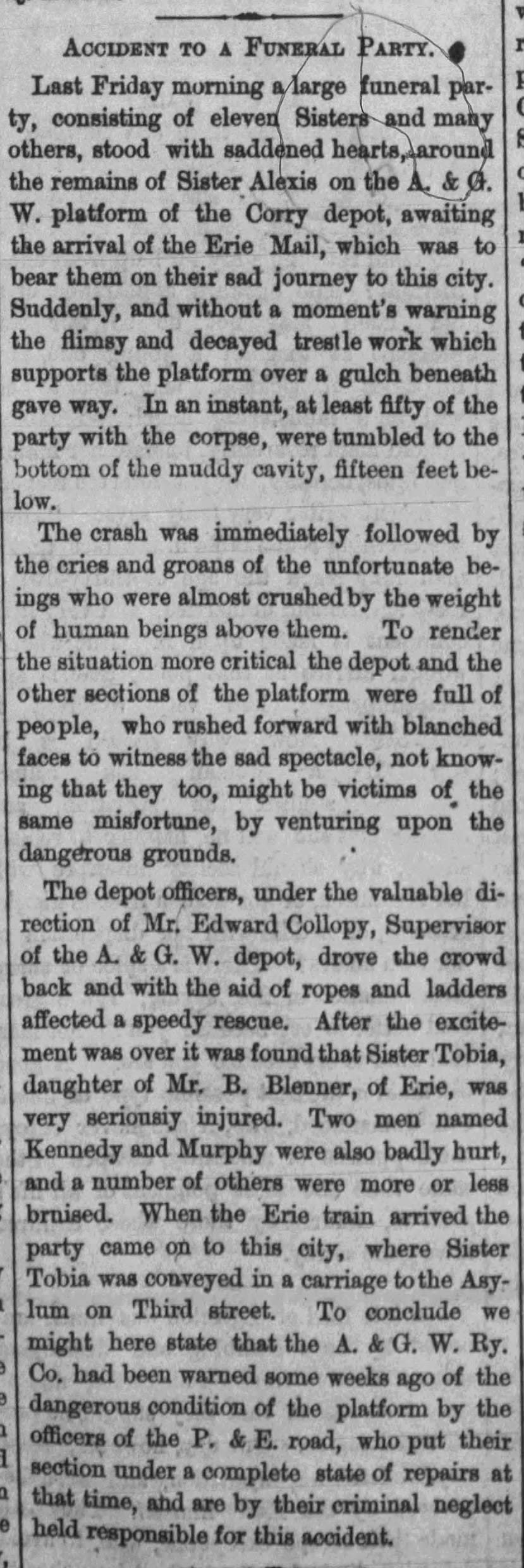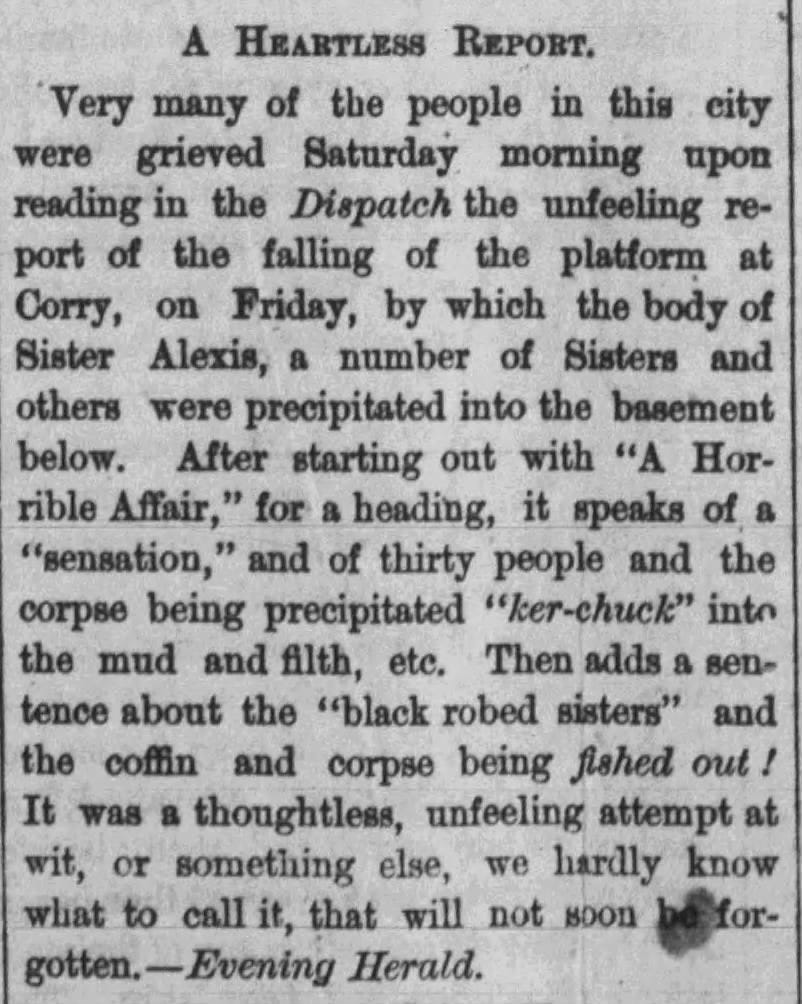Words have meaning, right?
Ask one version of A.I. what is meant by the word “word,” and you’ll find that a word “is a unit of language that serves as a principal carrier of meaning.”
Delve deeper into the virtual brain and you’ll find that not only do words have meaning but even “made-up” words can have a meaning (think: “supercalifragilisticexpialidocious”).
We don’t need the robotic cranium to tell us that words can sometimes offend – even made-up words.
Have you ever been offended by the made-up word “ker-chuck”?
Or the phrase “fished out”?
In 1878, Catholics, and in particular the Catholic press, in northwestern Pennsylvania were offended by both – and for good reason: they were rising to the defense of the dignity of the human person, triggered by the sarcastic reporting in the secular press of a sad incident involving the casket of a deceased nun.
During the 1870s the official Erie diocese newspaper, Lake Shore Visitor and the secular, often anti-Catholic Erie Dispatch regularly traded barbs. The Dispatch routinely attacked the pope, St. Patrick’s Day celebrations, and the Jesuits, but the incident that caused the greatest angst happened in November, 1878 in the nearby railroad town of Corry where a young nun had taken ill and died. As her casket lay on the platform of the railroad depot awaiting the train to Erie, the wooden structure collapsed sending the pallbearers and coffin into the ditch below. On November 30, the Visitor, reported the incident:
The Dispatch reported the incident as well but with much less sensitivity, referring to the falling of the casket and its bearers as being “ker-chucked” into the mud and filth and then being “fished out.”
The Visitor immediately objected by reprinting an editorial from a Dispatch competitor, the Erie Evening Herald:
This was seen by the Dispatch as a provocation and the war of words continued.
The Dispatch soon fired the next salvo. In a column where they feigned apology the Dispatch admitted that the words they used “were not particularly elegant and might very properly have been changed to others more appropriate to the sad occasion.”
The kerfuffle may have ended there had not the Dispatch continued to make use of certain remarks couched in ironical language or implicitly enumerated that the Visitor found objectionable: The Dispatch claimed that Bishop Tobias Mullen had written the piece criticizing their reporting and that he was intolerant of the opinions of others. A third claim of the Dispatch was that its report using the terms “ker-chuck” and “fished out” had been written by a Catholic: “A member of the Catholic Church in a responsible editorial position” on the staff of the Dispatch.
The Visitor responded posthaste on December 7 addressing each offending claim.
First, that the bishop wrote the article castigating the Dispatch:
The bishop has not seen, or does he care to see the horrible article in which the Dispatch described the catastrophe in Corry, but the extracts from that article, which he found in another paper, convinced him that it was conceived in the spirit and written in the style so characteristic of the Dispatch when treating of matters in which Catholics are concerned. Neither did the bishop see the severe but well merited rebuke, which the Visitor administered to the dispatch until that rebuke was already in print.
Second, that the bishop was intolerant of the opinions of others:
This proposition will be considered by those who know the bishop best, as false, yet it is not so easily disposed of because there is hardly a word in the English language about whose meaning men differ so widely as “intolerance.” The Visitor, for instance would consider the various inhuman expressions used by the Dispatch, describing the accident that occurred to the remains of a poor sister, who in life had made so many sacrifices for God and her neighbor, as extremely intolerant; while the Dispatch, it may be, with regard to language it then employed, feel it hardly inferior to the finest specimen of Christian charity and tolerance in the whole range of English literature!
Finally, regarding the claim that “ker-chuck” and “fished out” were products of a Catholic editorial writer on the staff of the Dispatch:
The Visitor respectfully submits that the Dispatch is not qualified, either by nature or training to say, who is or who is not a Catholic. First, for the simple reason (and here no offense to the gentleman is intended) that the proprietor is ignorant of what constitutes a Catholic. And second …whether the Catholic “in a responsible editorial position” on the Dispatch be one, the Visitor, as it knows him not, will not undertake to say. But if he be not and has not already become demoralized by his present association and would attach any value to a certificate of Catholicity from the proper quarter, surely, he cannot repress a smile when the proprietor of the Dispatch undertakes to provide him with an ecclesiastical passport. However respectable his present position, it is by no means an enviable one, or such as a sterling Catholic would long retain, compelled as he has been to assume before the public the responsibility for ker-chucking into the mire, and fishing out of the filth the mortal remains of a poor sister, and thus wantonly harrowing the feelings of the pious and unoffending community of women who now mourn that sister’s loss.
The Visitor concluded with a sentence that, finding nothing further from either party, seems to have won the battle:
“If the privilege be of any value to the Dispatch, that journal is at liberty to consider the present article the production of Bishop Mullen’s pen!”
NB: A later report explained the late sister was Sr. M. Alexis of the Sisters of St. Joseph who had taken ill quite suddenly. She was born Belle Cullen in Dunkirk, New York and had come to an Erie orphanage when she was quite young. She was only nineteen years old at the time of her unfortunate death. May she rest in peace. +







